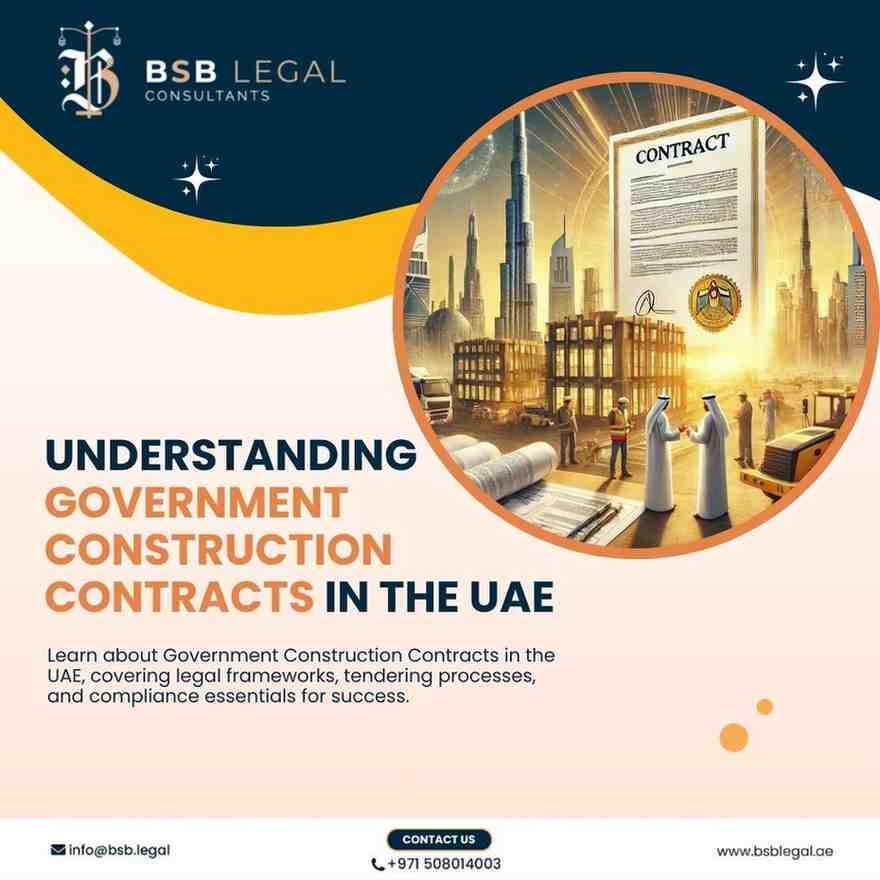


Learn about Government Construction Contracts in the UAE, covering legal frameworks, tendering processes, and compliance essentials for success.
In the United Arab Emirates (UAE), the construction industry is a vital contributor to the nation’s development, characterized by ambitious projects and significant investments. Government entities play a central role in many large-scale construction ventures, making it crucial for contractors and industry professionals to comprehend the intricacies of government construction contracts and dispute resolution processes.
Key Aspects of Government Construction Contracts
1. Arbitration: A Preferred Dispute Resolution Method
Arbitration has emerged as the preferred method for resolving construction disputes in the UAE, particularly in cases involving government entities. This preference stems from several advantages, including the ability for foreign parties to avoid entanglement with local courts, ensure privacy, and present matters to arbitrators with expertise in construction disputes.
FIDIC Contracts and Dispute Resolution
The widely used FIDIC suite of contracts governs many construction projects in the UAE. These contracts feature a multi-tiered dispute resolution process, emphasizing amicable settlement before resorting to arbitration. Adhering to this process is crucial, as demonstrated by legal precedents such as Dubai Cassation Case No. 167/1998, which highlights the requirement to refer disputes to an engineer or dispute board before arbitration.
Furthermore, contracting with the government introduces additional complexities, including strict regulations and lengthy approval processes. For instance, at the federal level, government entities must seek approval from the Ministry of Justice before entering into arbitration agreements. In Dubai, specific procedures must be followed, and contracts must comply with local regulations, including stipulating Dubai as the seat of arbitration.
2. State Immunity and Enforcement
An important consideration in government construction contracts is the issue of state immunity. While parties have the freedom to determine the governing law of their contract, certain laws mandate the application of UAE law in disputes involving government or quasi-governmental bodies. Despite this, parties can agree to arbitration outside the UAE, provided that UAE law governs the substantive aspects of the contract.
State immunity poses challenges in enforcement proceedings, as government entities enjoy immunity from execution under UAE law. Although parties may sign waivers of sovereign immunity, courts are cautious in enforcing such waivers, citing public policy concerns. This underscores the importance of crafting comprehensive arbitration clauses and seeking expert legal advice to navigate potential challenges.
3. Due Diligence and Contractual Compliance
Before entering into government construction contracts, thorough due diligence is essential to ensure the accuracy and enforceability of the contract. This includes technical, commercial, and legal assessments to mitigate risks and maximize the chances of a successful contract. Terminating a construction contract can be a lengthy and costly process, making proper due diligence crucial from the outset.
This process involves comprehensive assessments of technical, commercial, and legal aspects to safeguard against potential risks and ensure contractual compliance.
Technical Due Diligence
Technical due diligence encompasses evaluating the feasibility and viability of the construction project. This includes assessing the project’s scope, engineering requirements, environmental impact, and regulatory compliance. Understanding the technical intricacies of the project helps identify potential challenges and devise effective solutions to mitigate risks.
Commercial Due Diligence
Commercial due diligence involves analyzing the financial aspects of the project, including budgeting, funding sources, cash flow projections, and profitability forecasts. It also entails assessing market conditions, competition, and potential revenue streams. Conducting thorough commercial due diligence helps parties make informed decisions and ensures the project’s financial viability.
Legal Due Diligence
Legal due diligence focuses on assessing the legal aspects of the construction contract, including compliance with applicable laws, regulations, and contractual obligations. This includes reviewing the terms and conditions of the contract, ensuring alignment with local laws and regulations, and identifying any potential legal risks or liabilities. Legal due diligence also involves verifying the authenticity of documents, licenses, permits, and approvals required for the project.
Ensuring Contractual Compliance
Once due diligence is complete, ensuring contractual compliance is essential to avoid disputes and legal challenges down the line. This includes adhering to the terms and conditions stipulated in the contract, meeting project milestones and deadlines, and maintaining transparent communication between parties. It also involves addressing any discrepancies or issues promptly and proactively to prevent escalation.
Conclusion
Government construction contracts in the UAE present unique challenges and complexities that require careful consideration and compliance with legal requirements. Understanding the nuances of arbitration, state immunity, and contractual obligations is essential for parties involved in such projects. By adhering to best practices and seeking expert legal guidance in Dubai, stakeholders can effectively go through the complexities of government construction contracts.
